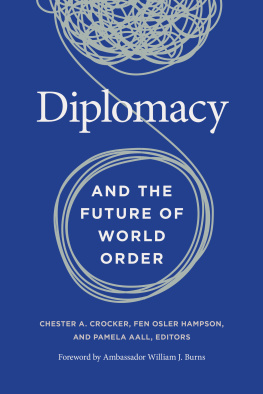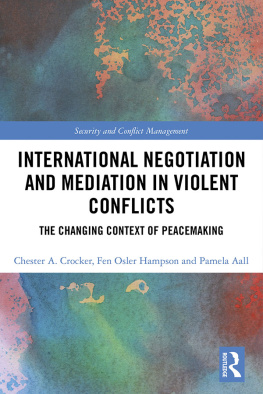DIPLOMACY AND THE FUTURE OF WORLD ORDER
Diplomacy
AND THE FUTURE OF WORLD ORDER
CHESTER A. CROCKER,
FEN OSLER HAMPSON,
AND PAMELA AALL, EDITORS
2021 Georgetown University Press. All rights reserved. No part of this book may be reproduced or utilized in any form or by any means, electronic or mechanical, including photocopying and recording, or by any information storage and retrieval system, without permission in writing from the publisher.
The publisher is not responsible for third-party websites or their content. URL links were active at time of publication.
Library of Congress Cataloging-in-Publication Data
Names: Crocker, Chester A., editor. | Hampson, Fen Osler, editor. | Aall, Pamela R., editor.
Title: Diplomacy and the future of world order / Chester A. Crocker, Fen Osler Hampson, and Pamela Aall, editors.
Description: Washington, DC : Georgetown University Press, 2021. | Includes bibliographical references and index.
Identifiers: LCCN 2020035282 | ISBN 9781647120931 (hardcover) | ISBN 9781647120948 (paperback) | ISBN 9781647120955 (ebook)
Subjects: LCSH: Diplomacy. | Conflict management. | Peace-building.
Classification: LCC JZ1305 .D54414 2021 | DDC 327.2dc23
LC record available at https://lccn.loc.gov/2020035282
This book is printed on acid-free paper meeting the requirements of the American National Standard for Permanence in Paper for Printed Library Materials.
22 21 9 8 7 6 5 4 3 2 First printing
Printed in the United States of America
CONTENTS
Chester A. Crocker, Fen Osler Hampson, and Pamela Aall
Chester A. Crocker, Fen Osler Hampson, and Pamela Aall
Jean-Marie Guhenno
Hans Binnendijk
Ana Palacio
Dmitri Trenin
Marcos Tourinho
Solomon Ayele Dersso
Shadi Hamid
Kanti Bajpai
See Seng Tan
Chas W. Freeman Jr.
Lise Morj Howard
Toby Dalton
Stacie Hoffmann, Samantha Bradshaw, and Emily Taylor
Daniel Benjamin
Chester A. Crocker, Fen Osler Hampson, and Pamela Aall
ILLUSTRATIONS
FIGURES
TABLES
FOREWORD
This is a timely and important book about the diplomacy of conflict management and peacemaking. The editors use the term peace and conflict diplomacy to describe managing others conflicts, coping with major power competition in third areas, and dealing with threats to the state system itself. By structuring their discussion around key actors, regions, and functional issues, they illustrate the varied roles that this kind of diplomacy may play in alternative futures for world orderand underscore its significance for the years ahead. Because we do not yet know how events will unfold or how leaders will behave, the book challenges us to imagine a range of possibilities, to grasp the importance of state and regional interactions, and to appreciate the critical role of leaders and leadership.
There are nineteen contributors to this provocative work; thankfully, they do not agree about everything. They note that regions may differ in the way they experienceand shapethe scenarios of world order considered here. But there is a broad consensus on two points: the centrality of human agency, and the role of major states in determining which scenario is realized. These factors will determine the space available for the important contributions to peacemaking by international and regional bodies and medium-sized to small states, as well as by civil society and nongovernmental organizations.
Too often, public commentary on world affairs and foreign policy occurs in an all-American echo chamber. Pundits opine on the ups and downs of the United States global leadership as if there were a widespread if not universal view of it. Commentary tends to oversimplify future global scenarios as the result of US decisions. But this book is different. It posits three potential scenarios for world order, and it evaluates them through the prism of nine regional or bilateral perspectives and four functional ones. Regional perspectives are provided by contributors from those global regionsa welcome feature of this analysis, and one that we at the Carnegie Endowment find very compatible with our own way of doing things.
Todays diplomatic in-box is bursting with both challenges at our doorstep and others just over the horizonwhich most diplomats and their bosses would prefer not to think about yet. In recent years, some of these challengesfrom the maintenance of alliances to the strengthening of the global arms control regimehave been sadly and dangerously neglected. Others, like multilateral engagement with international institutions, have become a political football in the United States, as other powers leap at the leadership roles that have long been the hallmark of American influence.
Evidently, diplomatic action is needed on many frontsfrom coping with the human and economic fallout of the COVID-19 pandemic, to working with partners to address climate change, to countering terrorism. Many of the most difficult and urgent diplomatic challenges occur in conflict environments, as the editors and contributors to this book rightly recognize.
Some have argued that political-military conflicts are yesterdays story, that our better angels are winning the struggle for the human soul, and thatin any casethe United States is overcommitted and should refrain from engaging in conflict management. However, my view of history is different. Although diplomatic intervention in conflicts can be sobering and sometimes futile, the costs of disengagement and retrenchment are likewise high. The arguments and analyses assembled by Crocker, Hampson, and Aall find a central place for peace and conflict diplomacy in each of the scenarios examined, even if the outcomes differ sharply. As the contributors lay out clearly in this thoughtful volume, much will depend on whether major powersincluding but not limited to the United Statesrenew habits of diplomatic collaboration, despite their intense competition in many areas, to shape a new and more effective multilateralism in the deeply contested era unfolding before us.
Ambassador William J. Burns
President, Carnegie Endowment for International Peace
ACKNOWLEDGMENTS
Planning for this project began in the fall of 2016, and there are many people to thank for their contributions and advice as we developed the themes and worked with our contributors, many of whom were present for the planning phase. We begin by recognizing the institutions that have supported our work: the Centre for International Governance Innovation (CIGI), Georgetown University, and the US Institute of Peace.
Three workshops played an important role in shaping our thought process throughout the project, and we offer our thanks to the participants in them, some of whom also contributed chapters to the volume. An initial workshop in Washington in June 2017 included Hans Binnendijk, Charles Call, Elizabeth Cousens, David Cunningham, Ashe Jain, Bruce Jones, Oliver Kaplan, Lauren Van Metre, George Moose, Deepa Ollapally, Simon Palamar, Tom Scherer, Jonathan Wilkenfeld, and William Zartman. A second workshop was convened by CIGI in Addis Ababa in February 2018, and we would like to thank the following African and Canadian participants: Yonas Adaye, Lloyd Axworthy, Abdeta Beyene, Solomon Dersso, Alfred Dube, Bushra Ebadi, Mulugeta Gebrehiwot, Mesfin Gebremichael, Paul and Yasemin Heinbecker, Kidane Kiros, Barouk Mesfin, Abdul Mohamed, Sunday Okello Angoma, Tigist Yeshiwas, and Fana WeldeSenbet.














